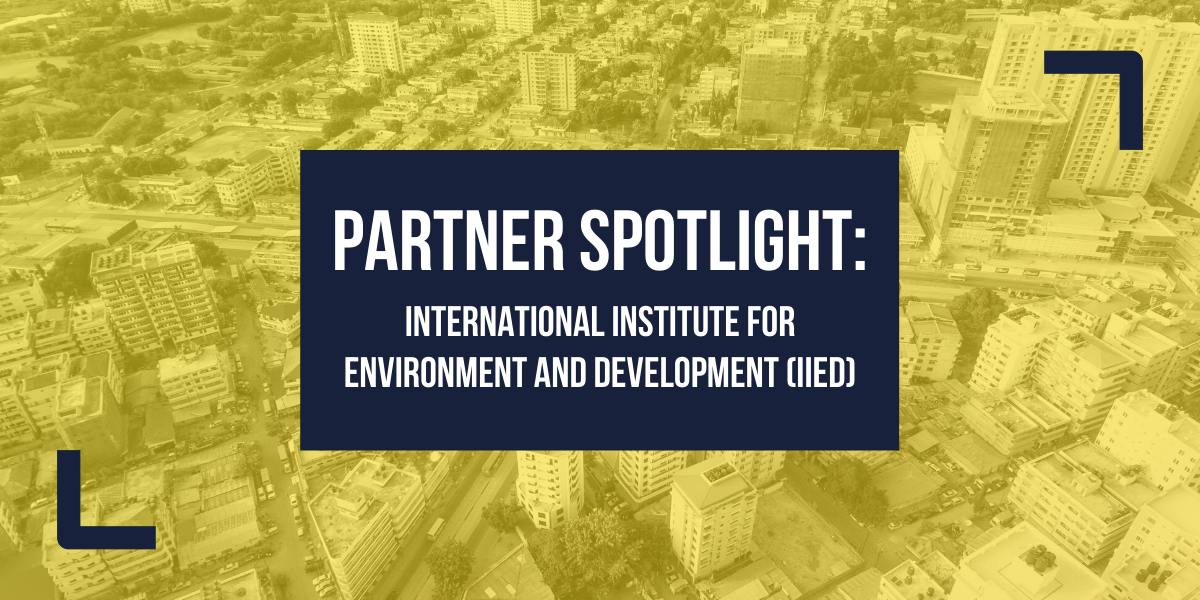The International Institute for Environment and Development (IIED) is a policy research institute, working for more equitable and sustainable development. Through partnerships with local organisations in cities in Africa, Asia and Latin America, IIED works to gather evidence, support advocacy, and influence key actors. IIED has four research areas: climate change, human settlements, natural resources, and shaping sustainable markets.
David Dodman is director of the human settlements research group at IIED and a lecturer at University College London. An urban geographer specialising in urban poverty, environmental risk and policy implementation, he became involved with ACRC through his experience of working with and directing a multi-disciplinary research group.

What do you think is the most important aspect that IIED brings the consortium?
IIED brings researchers with a huge amount of expertise across the thematic areas of the project. We also have experience in getting a wide variety of people with different academic backgrounds to work together, helping ensure that the various partners collaborate effectively and contribute complementarily to research efforts.
Although environmental risk is not the key focus of this project, IIED brings a solid understanding of these issues and how they can affect many other areas of development – such as understanding climate change resilience in the context of African cities – which is a useful addition to the programme.
“We are attempting to highlight the connections between cities, why these connections exist, and how this knowledge can be applied to effect change in the cities.”
What do you think is most interesting about ACRC’s approach to urban development?
Our programme follows a key hypothesis that that cities are made up of systems. While this statement is well accepted, it often falls into a general, ‘everything is connected’ narrative. We have the time and resources to really unpack this point in a useful way. Instead of just looking at individual, narrow events, we are attempting to highlight the connections between cities, why these connections exist, and how this knowledge can be applied to effect change in the cities.
ACRC does not make a claim for total universality of application, as we are analysing a range of different settings and cities, which gives the statement ‘cities of systems’ serious explanatory power.
What do you think is the most crucial challenge for development in African cities?
The most crucial challenge is the balance between economic competitiveness and inclusiveness. African cities need to attract investment and they need to create jobs, which does require a vibrant economy. However, the extent of the social and infrastructural challenges for the majority of people living in these cities is so massive that they cannot be resolved by simply stating that we will rebuild the economy and everything else will benefit simultaneously.
So the challenge for city leaders, national governments, and researchers who provide evidence to support development, is to get that balance right. They need to boost cities’ economies while at the same time addressing the pervasive issues of poverty and marginalisation.
“The most crucial challenge is the balance between economic competitiveness and inclusiveness.”
What is the most exciting thing for you about this project?
The fact that this is genuinely a ‘consortium’ effort is really exciting. The level of expertise that we will be drawing on, and the length of time that we have to grapple with challenges and contradictions, should generate an unprecedented level of analysis of African urban systems. It’s also great that the timeframe allows us to try out numerous solutions, enabling us to tie together the problem analysis and the implementation of responses.
Read more from IIED:
- Outside the large cities
- Informal settlement data and local community responses to COVID-19 and climate risks
- Getting attention to a much-neglected health agenda: occupational health and safety
- Rethinking humanitarian aid for refugees as investment in urban water and sanitation
Follow IIED’s work:
Note: This article presents the views of the author featured and does not necessarily represent the views of the African Cities Research Consortium as a whole.
The African Cities blog is licensed under Creative Commons Attribution-NonCommercial-NoDerivatives 4.0 International (CC BY-NC-ND 4.0), which means you are welcome to repost this content as long as you provide full credit and a link to this original post.


